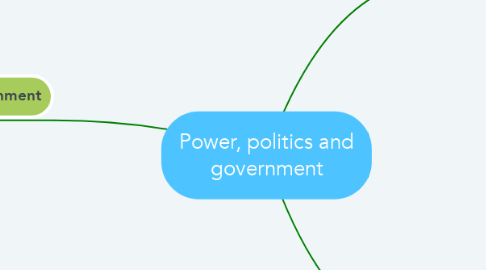
1. Government
1.1. What is government
1.1.1. A system or group of people governing an organize community (usually a state)
1.2. Purpose of government
1.2.1. Keeping the society stable. Keeping the people safe and making things go in the right order; defending the society; maintaining and improving the life quality.
1.3. Coercion
1.3.1. Persuading someone by using force or threats.
1.4. Building blocks of a government
1.4.1. Coercion
1.4.1.1. The uses of force by the government to make people behave in a certain way. Examples: police force, court, punishments for crimes.
1.4.2. Collective revenue
1.4.2.1. The money they get from their people (usually through taxes) for public services and protection.
1.5. Public goods
1.5.1. Goods and services that the government provide to the citizens to improve the quality of life. Example: national defense, infrastructure, etc.
1.6. Polity
1.6.1. An identifiable political entity.
1.7. Characteristics of nation states.
1.7.1. Definition: a sovereign state whose citizens or subjects are relatively homogeneous in factors such as language or common descent.
1.7.2. Population
1.7.3. Territory
1.7.4. Government
1.7.5. Sovereignty
1.7.6. Nationalism
2. Power
2.1. Definition
2.1.1. Power is the ability of an individual to influence the behavior of others.
2.2. Authority
2.2.1. The legitimate power of an individual or a group which is practiced over another.
2.3. Legitimacy
2.3.1. The legal rights and acceptance of an authority.
2.4. Social contract theory
2.4.1. The view that individuals' moral or political obligations are dependent upon a contract or agreement among them to form the society in which they live. In other words, individuals give away some of their freedom for benefits that come out of the cooperative living.
2.5. Type of power
2.5.1. Legitimate power
2.5.1.1. Defined by the position held.
2.5.2. Coercive power
2.5.2.1. Forcing through threatening to provoke fear from others.
2.5.3. Reward power
2.5.3.1. Using rewards to influence people.
2.5.4. Expert power
2.5.4.1. The power of knowledge and skills.
2.5.5. Referent power
2.5.5.1. Reverence gained by having strong interpersonal relationship skills.
2.5.6. Informational power
2.5.6.1. The possession of needed or wanted information.
3. Politics
3.1. What is politics
3.1.1. The activities associated with the governance of a country or other area, especially the debate or conflict among individuals or parties having or hoping to achieve power.
3.2. What is institution
3.2.1. Mechanisms which govern the behavior of a set of individuals within a given community.
3.3. Characteristics of political activities
3.3.1. People think about their decisions to achieve a certain goal and weight the costs and benefits needed for that decision.
3.3.2. Working together as a group can achieve the common goal.
